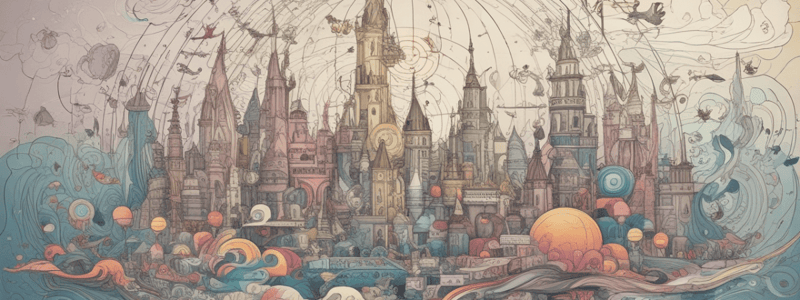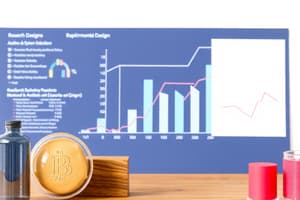Podcast
Questions and Answers
What is the primary purpose of an experimental design?
What is the primary purpose of an experimental design?
- To identify the independent and dependent variables
- To collect as much data as possible
- To create controlled conditions and limit outside interference (correct)
- To prove a hypothesis
What is the main difference between a scientific law and a scientific theory?
What is the main difference between a scientific law and a scientific theory?
- A scientific theory explains why things occur, while a scientific law is a pattern (correct)
- A scientific law explains why things occur, while a scientific theory is a pattern
- A scientific law is a hypothesis, while a scientific theory is a conclusion
- A scientific law is a conclusion, while a scientific theory is a hypothesis
What is precision in the context of experimental design?
What is precision in the context of experimental design?
- How close all measurements are to one another (correct)
- The type of equipment used
- How close the values collected are to the real value
- The degree of accuracy of the equipment
What is the role of the experimenter in an experiment?
What is the role of the experimenter in an experiment?
Why is background knowledge important in experimental design?
Why is background knowledge important in experimental design?
What is the purpose of the independent variable in an experiment?
What is the purpose of the independent variable in an experiment?
What is the role of the experimenter in an experiment?
What is the role of the experimenter in an experiment?
What type of values are collected in an experiment?
What type of values are collected in an experiment?
What is the purpose of a placebo group in an experiment?
What is the purpose of a placebo group in an experiment?
What is the first step in creating a good experiment?
What is the first step in creating a good experiment?
What is the primary purpose of the scientific method?
What is the primary purpose of the scientific method?
What is the role of the control group in an experiment?
What is the role of the control group in an experiment?
What is the purpose of formulating a hypothesis?
What is the purpose of formulating a hypothesis?
What is the independent variable in an experiment?
What is the independent variable in an experiment?
What is the purpose of defining variables in the experimental design process?
What is the purpose of defining variables in the experimental design process?
Flashcards are hidden until you start studying
Study Notes
Experimental Design
- Experimental design is a way to test a hypothesis through a series of steps to create controlled conditions for an experiment and limit exposure to outside interference.
- The purpose of experimental design is to form a conclusion based on a hypothesis, and the outcome can lead to supporting evidence of scientific law and scientific theory.
Independent and Dependent Variables
- Independent variable is manipulated in an experiment, and the experimenter causes it to change.
- Dependent variable changes as an effect of the independent variable being changed.
Scientific Law and Theory
- Scientific theory explains why things occur the way they do after significant repeated experiments.
- Scientific law is a pattern, typically established through an equation.
- A theory cannot become a law, and a law cannot become a theory.
Good Experiment
- A good experiment requires background knowledge in the area of the experiment.
- Proper equipment is necessary, and it must be accurate and precise.
- Accuracy is how close the values collected are to the real value, and precision is how close all measurements are to one another.
Experimental Design Process
- The experimental design process has five steps: define variables, formulate a hypothesis, design an experiment, assign subjects, and measure the dependent variable.
- The process starts with having a testable idea (hypothesis) and asking questions to decide on what information to find with the experiment.
Define Variables
- Defining variables is the first step in the experimental design process.
- There are three types of variables: independent, dependent, and control.
- Independent variable is what the experimenter will change, and the dependent variable changes due to the independent variable.
Formulate Hypotheses
- A hypothesis is an educated guess about what the outcome of the experiment will be before the experiment is conducted.
- The purpose of a hypothesis is to prove or disprove it at the end of the experiment.
Experimental Design Science (Treatment and Control Group)
- Experiments have a treatment group and a control group.
- The treatment group is the group that the experiment is performed on, and the control group does not receive any changes or treatment.
Assign Subjects
- Assigning subjects in an experiment could be a random selection, random assignment, or both.
- Random selection is picking a population for the experiment, and random assignment is how the subjects are grouped for the experimental design.
Measure the Dependent Variable
- The dependent variable is measured as part of the experiment, and the change of the dependent variable is the value needed to analyze the data.
- The results are measured by collecting qualitative or quantitative values.
Studying That Suits You
Use AI to generate personalized quizzes and flashcards to suit your learning preferences.




